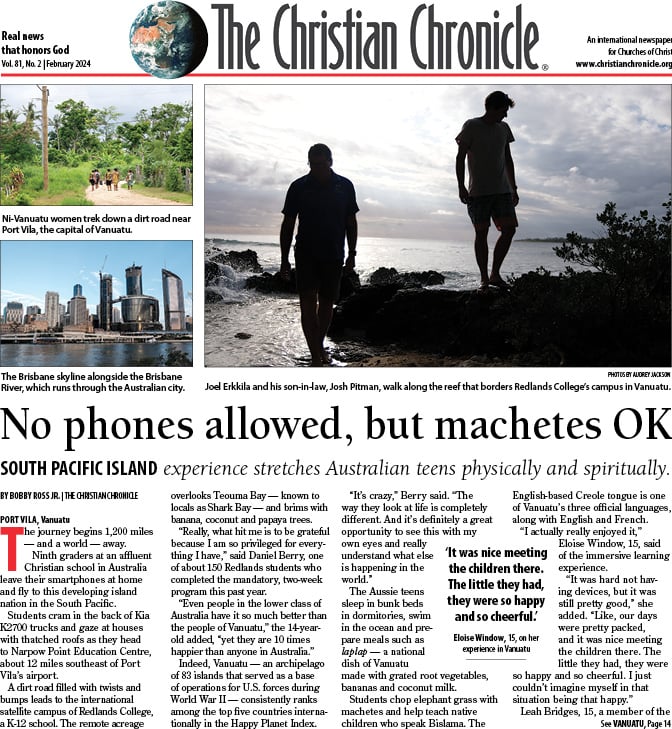Dialogue: A conversation with David Fleer
POWERPOINT AND PLAGIARISM are among the subjects preachers should consider prayerfully, says Fleer, professor of Bible and communication at Lipscomb University in Nashville, Tenn.
Great preaching is a passion for David Fleer, who last year preached for churches in 30 communities across the nation.
It is no surprise, therefore, that his teaching focus, at Rochester College in Michigan and now at Lipscomb University in Tennessee, is homiletics — the study of the composition and delivery of sermons. At Rochester, he directed the annual Sermon Seminar, which drew attendees from more than 30 states. He now leads Lipscomb’s Conference on Preaching, which draws 200 ministers from around the world.
Fleer holds a Master of Divinity from Abilene Christian University in Texas, a Doctor of Ministry from Fuller Theological Seminary in California, a master’s in communication from Portland State University in Oregon and a doctorate in communication from the University of Washington. He also has a diploma from Sunset International Bible Institute in Lubbock, Texas.
Fleer and his wife of 33 years, Mae, have three sons: Josh is a doctoral student in American Religious History at Florida State University; Luke, married to Marrianne, works at Oakland University in Michigan; and Nate is a freshman at Oakland University.
Is preaching changing? How?
Over the past 20 years I’ve listened to some of the finest young preachers in North America and firmly believe that preaching is improving in remarkable ways.
Homileticians can be harsh critics — after all, our job is to evaluate and “judge” sermons. Often I’ll hear a sympathetic word from an academic in another discipline, “Must be tough to listen to all those student sermons.”
Given the sermons I hear, the answer is “No!” I’ve been encouraged and filled with hope from the high-quality sermons I consistently hear.
What are the reasons for your optimism?
I sense a breakthrough toward excellence for a variety of reasons. Opportunities abound for preachers who are turning to books, conferences and degree programs to cultivate discipline, study and new insights for preaching. The results are being felt in churches everywhere.
At the same time, “our people” have some healthy instincts when it comes to the intersection of preaching and Scripture. We look for more than a proof text to support a preconceived notion. We long for understandings and life-changing commitments that emerge from the biblical text. We celebrate a fresh encounter with the world envisioned in the Bible.
What are the elements of a good sermon?
The list is long, but here are some questions that begin to evaluate the quality of a sermon:
Does the sermon reflect preparation that has taken the preacher to the text, to stay in the text long enough for meaning to surface? This exegetical probing is always visible in the sermon, even in discreet ways.
Does the sermon move the congregation into the world Scripture envisions, not just objectively walking like an archeologist with spade and pail around a passage, but moving into the heat and challenge of biblical reality?
Does the preacher “get it heard?” That’s something other than just getting it said (reflecting on the great work of Fred Craddock). Does the congregation actively participate as listeners? Congregations may be verbally quiet as church mice, but do they participate in their hearts and minds, preparing for action in their lives?
Does the sermon matter? Are the weightier matters of life and Bible reflected in the sermon? Life is too short and the times too critical to miss God’s deepest concerns.
PowerPoint: Good or bad?
PowerPoint is a great tool for the classroom. I welcome to my non-homiletic classrooms attractive and memorable PowerPoint presentations. (I have discovered, however, that a D student still creates D presentations, even with the snazziest PowerPoint bullets.)
PowerPoint can be an excellent teaching tool. But sermons are meant to do more than teach. The church’s first homiletic declared that while teaching is a “necessity” and pleasing a “sweetness,” a sermon that persuades is “the victory.”
In our history we’ve given limited attention to the pleasing and persuading elements of a sermon, seldom able to discern the sermon from the lecture, except by the hour of delivery! As we begin to recover the sermon’s pleasing and persuading qualities, in an attempt to say and do what the biblical text under consideration is saying and doing, PowerPoint works against us, underscoring the preacher’s technological savvy and limiting the experience to learning material (while leaving lives unchanged).
For preachers, is there a line between borrowing and plagiarism?
You’ve touched on a topic that preachers and congregations seldom discuss — although it festers in surprising locations!
The custom has historical precedence. Augustine once advised, “Some can speak well but cannot think of anything to say.” For persons without time or training and struggling with the art, he suggested, “If they take something … written by others, memorize it and offer it to the people in the person of the author, they do not do wickedly.”
The problem arises with the pretense of authorship and creativity. Most churches assume the preacher to be the author of the sermon. To use the work of another and allow the ruse is plagiarism.
The problem worsens with practice. For this reason, I do not post on the Web lengthy segments of conference sermons. To needy preachers, the addiction to borrowing is quick, long-lasting and deadly. The minister’s creativity, discipline and integrity are at risk.
How do you deal with plagiarism?
In the classroom I’ve been tough on students, threatening expulsion for crimes of plagiarism, claiming that cheating in the academy is as deadly as adultery to a marriage. I came to this position after working through my initial naivete — that students at a Christian college enrolled in a Bible class were incapable of cheating.
To overcome similar naivete in the pew, elders and search committees might acknowledge pulpit plagiarism’s pervasiveness and articulate their concerns to the preacher: “We didn’t hire Rick Atchley or Ravi Zacharias, we hired you. We want to hear your best work. Don’t cheat yourself, us or God.”
For the preacher, recovery begins by acknowledging the sin to trusted friends, followed by a renewed commitment before God and the congregation to the rigor of preparation and moral excellence.
Great preaching is a passion for David Fleer, who last year preached for churches in 30 communities across the nation.
It is no surprise, therefore, that his teaching focus, at Rochester College in Michigan and now at Lipscomb University in Tennessee, is homiletics — the study of the composition and delivery of sermons. At Rochester, he directed the annual Sermon Seminar, which drew attendees from more than 30 states. He now leads Lipscomb’s Conference on Preaching, which draws 200 ministers from around the world.
Fleer holds a Master of Divinity from Abilene Christian University in Texas, a Doctor of Ministry from Fuller Theological Seminary in California, a master’s in communication from Portland State University in Oregon and a doctorate in communication from the University of Washington. He also has a diploma from Sunset International Bible Institute in Lubbock, Texas.
Fleer and his wife of 33 years, Mae, have three sons: Josh is a doctoral student in American Religious History at Florida State University; Luke, married to Marrianne, works at Oakland University in Michigan; and Nate is a freshman at Oakland University.
Is preaching changing? How?
Over the past 20 years I’ve listened to some of the finest young preachers in North America and firmly believe that preaching is improving in remarkable ways.
Homileticians can be harsh critics — after all, our job is to evaluate and “judge” sermons. Often I’ll hear a sympathetic word from an academic in another discipline, “Must be tough to listen to all those student sermons.”
Given the sermons I hear, the answer is “No!” I’ve been encouraged and filled with hope from the high-quality sermons I consistently hear.
What are the reasons for your optimism?
I sense a breakthrough toward excellence for a variety of reasons. Opportunities abound for preachers who are turning to books, conferences and degree programs to cultivate discipline, study and new insights for preaching. The results are being felt in churches everywhere.
At the same time, “our people” have some healthy instincts when it comes to the intersection of preaching and Scripture. We look for more than a proof text to support a preconceived notion. We long for understandings and life-changing commitments that emerge from the biblical text. We celebrate a fresh encounter with the world envisioned in the Bible.
What are the elements of a good sermon?
The list is long, but here are some questions that begin to evaluate the quality of a sermon:
Does the sermon reflect preparation that has taken the preacher to the text, to stay in the text long enough for meaning to surface? This exegetical probing is always visible in the sermon, even in discreet ways.
Does the sermon move the congregation into the world Scripture envisions, not just objectively walking like an archeologist with spade and pail around a passage, but moving into the heat and challenge of biblical reality?
Does the preacher “get it heard?” That’s something other than just getting it said (reflecting on the great work of Fred Craddock). Does the congregation actively participate as listeners? Congregations may be verbally quiet as church mice, but do they participate in their hearts and minds, preparing for action in their lives?
Does the sermon matter? Are the weightier matters of life and Bible reflected in the sermon? Life is too short and the times too critical to miss God’s deepest concerns.
PowerPoint: Good or bad?
PowerPoint is a great tool for the classroom. I welcome to my non-homiletic classrooms attractive and memorable PowerPoint presentations. (I have discovered, however, that a D student still creates D presentations, even with the snazziest PowerPoint bullets.)
PowerPoint can be an excellent teaching tool. But sermons are meant to do more than teach. The church’s first homiletic declared that while teaching is a “necessity” and pleasing a “sweetness,” a sermon that persuades is “the victory.”
In our history we’ve given limited attention to the pleasing and persuading elements of a sermon, seldom able to discern the sermon from the lecture, except by the hour of delivery! As we begin to recover the sermon’s pleasing and persuading qualities, in an attempt to say and do what the biblical text under consideration is saying and doing, PowerPoint works against us, underscoring the preacher’s technological savvy and limiting the experience to learning material (while leaving lives unchanged).
For preachers, is there a line between borrowing and plagiarism?
You’ve touched on a topic that preachers and congregations seldom discuss — although it festers in surprising locations!
The custom has historical precedence. Augustine once advised, “Some can speak well but cannot think of anything to say.” For persons without time or training and struggling with the art, he suggested, “If they take something … written by others, memorize it and offer it to the people in the person of the author, they do not do wickedly.”
The problem arises with the pretense of authorship and creativity. Most churches assume the preacher to be the author of the sermon. To use the work of another and allow the ruse is plagiarism.
The problem worsens with practice. For this reason, I do not post on the Web lengthy segments of conference sermons. To needy preachers, the addiction to borrowing is quick, long-lasting and deadly. The minister’s creativity, discipline and integrity are at risk.
How do you deal with plagiarism?
In the classroom I’ve been tough on students, threatening expulsion for crimes of plagiarism, claiming that cheating in the academy is as deadly as adultery to a marriage. I came to this position after working through my initial naivete — that students at a Christian college enrolled in a Bible class were incapable of cheating.
To overcome similar naivete in the pew, elders and search committees might acknowledge pulpit plagiarism’s pervasiveness and articulate their concerns to the preacher: “We didn’t hire Rick Atchley or Ravi Zacharias, we hired you. We want to hear your best work. Don’t cheat yourself, us or God.”
For the preacher, recovery begins by acknowledging the sin to trusted friends, followed by a renewed commitment before God and the congregation to the rigor of preparation and moral excellence.



